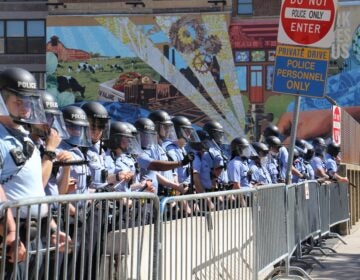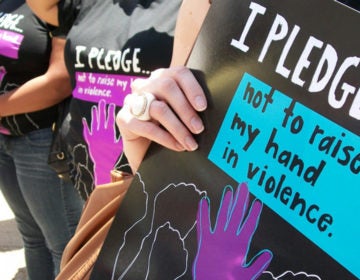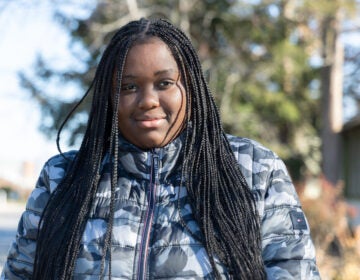Intersecting issues: Supporting domestic violence survivors, defunding police
When people call for defunding the police, what does that mean for survivors of domestic violence? Activists and others are exploring that question.
Listen 1:22
Protesters march Saturday, June 6, 2020, in New York following the police killing of George Floyd in Minneapolis. (AP Photo/Ragan Clark)
When people call for defunding the police, what does that mean for survivors of domestic violence?
Activists, educators, students and social workers, from places as close as West Philadelphia and as far as Chicago and Oakland, explored that question during a remote workshop and discussion hosted by Lutheran Settlement House, a community-based nonprofit in Philadelphia.
The Tuesday afternoon event was the third Lutheran Settlement House has hosted on the topic. Initially, it planned just one session in June, but when interest proved strong — registration was capped at 40, with more than 50 on a waitlist for that first virtual gathering — organizers realized they needed to host it again. And again. And again — the third session also sold out, and Lutheran Settlement House staff is planning for the fourth.
Where domestic-violence survivor support intersects with issues of abolishing police departments and prisons isn’t a novel topic, said Liz Coda, a workshop participant and community educator for Philly-based nonprofit Women Against Abuse, “but … it’s gotten so much attention that it’s something people are talking about more frequently.”
Coda said that she’s had several informal conversations with friends and colleagues about similar issues, but that she came to the formal discussion Tuesday with new interest.
“It’s actually something that we as individuals, within our roles at Lutheran Settlement, have been thinking and talking about forever, as long as we’ve known each other and been working together,” said Toby Fraser, one of the training facilitators. “This is a conversation that’s been part of the movement for survivor support since the very beginning.”
The shift, Fraser said, is in prospective participants’ willingness to consider police abolition as a viable option. As protests sparked by the police killing of George Floyd in Minneapolis and the movement against police brutality spread across the country this summer, it offered new paths to direct conversations.
Those conversations often start, as Tuesday’s did, with a list.
“When we talk about what domestic violence is, all the different types of violence that exist, we’ll often step back for a moment and say OK, look at this list or this chart … [which] of those things are against the law? If police were called to deal with it, would they actually respond, or respond supportively?” asked Fraser.
“And time and time and time again, in every single training, they’ll say, ‘Oh yeah, most of what is abusive is not actually against the law.’ And [police officers’] job, for better or for worse, is to enforce laws.”
The default response might be to change the laws or expand them, but that hasn’t worked in the past: mandatory arrest laws can escalate intimate partner violence or increase the likelihood of survivors’ arrest, while increased state intervention policies mean that their effectiveness in protecting survivors varies widely. Even mandatory reporting laws can reduce survivors’ ability to seek support.
More police doesn’t necessarily translate to better survivor support either, Fraser’s co-trainer, Richie Schulz, said during Tuesday’s workshop. Police presence can sometimes exacerbate issues of domestic violence, or make a survivor less likely to report again.
Hyejin Shim, a participant from Oakland and the sexual assault program coordinator for the Asian Pacific Institute of Gender-Based Violence, said many of the survivors she’s worked with don’t want any contact with police at all. Undocumented migrants, queer people, Black and other people of color may fear state violence just as much — or even more than — interpersonal harm. Providing support for them may mean providing safety not just from an abuser, but from the governmental system as well.
If law enforcement isn’t the answer, what is?
Many organizations providing support for domestic violence survivors still rely on state and local police departments as part of their approach. For example, Coda’s organization, Women Against Abuse, has a full legal department and currently works fairly closely with Philadelphia police, although she said it has recently “begun to touch upon the idea of changing or rethinking [that] relationship.”
In June, the California Coalition Against Sexual Assault released a statement in solidarity with racial justice advocates, stating that “our movement has over-relied on law enforcement as a primary response to sexual assault, rather than focusing on solutions that will prevent violence in the first place.” On the same day, the Pennsylvania Coalition Against Rape and the New Jersey Coalition against Sexual Assault issued similar releases, with slightly different messages: PCAR’s statement contained a call to “reimagine the role that police play in our society” and “hold law enforcement officials accountable,” without any specific mention of changing its survivor support approaches, while NJCSA’s statement referred to a legal system “defined by systemic racism and a failure to deliver justice,” and emphasized the right to protest that system.
“Domestic violence work is abolitionist work,” Fraser said. “They’re movements that are together and joined.” But, he added, that’s a hopeful portrayal of a still-complicated dialogue, even within activist and organizer circles.
Shim is the co-founder of Survived & Punished, an abolitionist organization working to end the criminalization of survivors of domestic and sexual violence, who are frequently prosecuted and incarcerated for defending themselves from their abusers. In her experience, she said, “advocates and organizations are often afraid of challenging the police, or challenging district attorneys that they think they must rely on in order to prosecute domestic violence.”
That political tension — the feeling of needing to be legitimized by a system that also causes harm — can be difficult to sit with, she said. “[But] at this point, we don’t really get to be surprised when things go badly when the police are involved. There’s a long history of it, it’s happening all the time, especially when you’re working with marginalized communities.”
Shim said plans dependent on calling the police and filing restraining orders are too simplistic and may not help survivors, let alone guarantee protection. The conversation on Tuesday was an entry point; now, direct service providers need to have concrete measures for securing funding, running scenarios and creating safety plans that include the possibility of state-sanctioned harm.
“We have come to compartmentalize different types of violence: DV [domestic violence], sexual violence, state-sponsored violence, racial violence. But when we try to address one type of violence while actively involving another type of violence, we aren’t engaging in true harm reduction,” said workshop participant Danielle Gatto, a volunteer with Philadelphia’s Women in Transition, in an email to WHYY.
Why didn’t this conversation enter the mainstream earlier?
“I think it’s been a lot of the same people bringing it up for decades — mostly, if not all, women of color — and I think it hasn’t changed because of racism and whiteness,” Shim said during the workshop. “People are very invested in the idea that the prison and policing system works, or that there is some kind of justice for the really heinous acts of gender violence that are occurring constantly.”
She paused, then added, “I think people don’t really conceptualize domestic violence survivors as people who could potentially be arrested or incarcerated … I think it’s a lot of racism. I think it’s a lot of racism around who gets considered a victim, and who a perpetrator or abuser is.”
After the Zoom call ended, Coda recalled Fraser describing police and prisons as abusive partners to the communities that they work with.
“That really stuck with me,” she said. “The amount of harm that’s being done, the amount of gaslighting that’s being done … As advocates against domestic violence and domestic abuse, the focus is so often on such a micro-level, like the abuser and the survivor, or maybe the survivor’s family is involved. This is taking it to a much more macro-level, [because] the systems that we currently have are really complicit in the abuse that we’re trying to fight against.”
___
If you or someone you know has been affected by domestic violence, call the citywide, 24-hour Philadelphia Domestic Violence Hotline (1-866-723-3014) for crisis intervention, safety planning, resources and referrals. All calls are free, confidential and anonymous.
WHYY is your source for fact-based, in-depth journalism and information. As a nonprofit organization, we rely on financial support from readers like you. Please give today.







